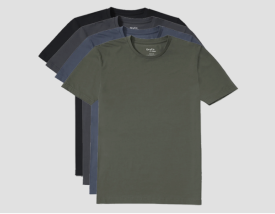You climb into bed for a good night’s rest, only to wake hours later feeling overheated and drenched. It’s a familiar scenario for anyone who experiences night sweats, also called nocturnal hyperhidrosis. This common condition can turn restful sleep into a nightly challenge.
Sometimes it’s caused by a warm room or a heavy blanket. Other times, it’s your body working overtime, triggered by hormones, stress, illness, or certain medications. But whatever the reason, there’s one common consequence that often flies under the radar: dehydration.
Understanding the link between night sweats and dehydration can help you take control of your nights again. With a few lifestyle tweaks, smarter hydration, and the right sweatproof undershirt, you can wake up dry, refreshed, and ready to move.
Why Night Sweats Happen
Your body naturally cools down as you sleep. But sometimes, this internal temperature control goes off balance. When that happens, your body releases excess heat through sweat, often in large amounts. Common reasons include:
● Hormonal changes (menopause, perimenopause, or thyroid issues)
● Anxiety or stress
● Certain medications
● Infections or chronic illnesses
● Sleep disorders or high room temperatures
For some, the problem is mild. For others, it’s severe enough to soak through bedding and clothing every night. This ongoing pattern is known as nocturnal hyperhidrosis, a medical form of excessive sweating during sleep.
The Connection Between Sweating and Dehydration
Sweating is how your body cools itself. But when it happens excessively, especially at night, it can strip away vital fluids faster than you realize.
You lose not just water, but electrolytes like sodium, potassium, and magnesium. This imbalance can leave you waking up with headaches, muscle cramps, dizziness, and dry mouth. Over time, sweating and dehydration can affect your energy, concentration, and even your skin’s health.
The tricky part is you might not feel thirsty right away. When you sleep through intense sweating, you often don’t replace what you lose. That’s why many people with chronic night sweats wake up groggy and fatigued, even after a full night’s rest.
Who’s More at Risk
Certain groups are more prone to night sweats and dehydration:
● Menopausal and perimenopausal women: Hormone fluctuations cause hot flashes that can drench clothing several times a night.
● People with high anxiety or stress levels: Your nervous system ramps up sweating during moments of emotional tension, even in your sleep.
● Those with chronic illnesses: Conditions like lymphoma, diabetes, or infections can alter your body’s temperature control.
● Athletes and active individuals: If you go to bed already slightly dehydrated from exercise, your body has less fluid to spare when sweating kicks in.
How Dehydration Shows Up After Night Sweats
When your body loses too much water overnight, you’ll likely notice it first thing in the morning. Look out for:
● Dry or sticky mouth
● Fatigue or weakness
● Headaches or lightheadedness
● Dark yellow urine
● Muscle cramps
● Brain fog or irritability
Even mild dehydration can disrupt your morning rhythm. If this cycle repeats often, it can take a toll on your mood, metabolism, and skin elasticity.
Balancing Hydration Without Overdoing It
Drinking more water is an obvious fix, but it’s about timing and balance. Here’s how to stay hydrated without waking up all night.
● Replenish early: Drink a full glass of water first thing in the morning. It’s the quickest way to replace what you lost overnight.
● Sip through the day: Small sips every hour help your body absorb fluids better than chugging large amounts at once.
● Adjust for activity: If you work out or spend time outdoors, add 12 extra ounces of water for every 30 minutes of exercise.
● Add water-rich foods: Fruits and vegetables like cucumbers, watermelon, oranges, and spinach naturally support hydration.
● Cut off caffeine and alcohol early: Both act as diuretics, making you lose more water. Try to stop caffeine eight hours before bed and alcohol at least three hours before sleep.
Clothing for Nocturnal Hyperhidrosis: Why Fabric Matters
If you’ve ever slept in a regular cotton tee and woken up feeling clammy, you already know that fabric choice matters. The wrong material traps moisture, while the right one moves it away from your skin. That’s where sweatproof undershirts make a real difference.
Unlike standard sleep shirts, sweatproof options are built with moisture-wicking layers that pull sweat off your skin, absorb it, and prevent it from seeping into your bedding. They help regulate body temperature, keeping you cool and dry all night.
Popular materials for sweatproof undershirts include:
● MicroModal: Ultra-soft, breathable, and more absorbent than cotton. Ideal for sensitive skin.
● TENCEL: Made from eucalyptus fibers, this fabric naturally regulates temperature and resists odor buildup.
● Bamboo Rayon: Known for its cool, airy feel and eco-friendly properties.
● Spandex and Polyester Blends: Offer stretch, comfort, and moisture resistance, perfect for people who move a lot in their sleep.
These smart fabrics work together to wick moisture and minimize the heavy, damp feeling that interrupts rest.
The Role of a Sweatproof Undershirt
A sweatproof undershirt acts like your body’s second skin, managing moisture so you don’t have to.
Here’s what it does while you sleep:
● Wicks moisture away: Keeps sweat from pooling on your skin.
● Prevents visible marks: Stops moisture from soaking your sleepwear or sheets.
● Regulates temperature: Helps your body stay in its ideal thermal comfort zone.
● Protects your skin: Reduces irritation caused by constant dampness.
If you deal with nocturnal hyperhidrosis, a specialized hyperhidrosis undershirt offers extra coverage under the arms and across the chest or back, common problem zones for excessive sweating. It’s designed to trap and evaporate sweat discreetly, so you stay dry and confident, even on your most restless nights.
Frequently Asked Questions
Can dehydration make night sweats worse?
Yes. When you’re dehydrated, your body struggles to regulate temperature properly, which can increase sweating.
Do sweatproof undershirts actually help with night sweats?
They do. These shirts are made with breathable, moisture-wicking fabrics that prevent sweat from soaking through your clothes or sheets.
Should I drink water right before bed to prevent dehydration?
A few sips are fine, but avoid large amounts. Too much water right before bed can cause frequent bathroom trips.
How can I tell if my night sweats are serious?
If they’re frequent, severe, or paired with symptoms like fever, chills, or weight loss, consult a doctor.
Can anxiety or stress cause night sweats?
Yes. Stress activates your sympathetic nervous system, which can increase body temperature and trigger sweating during sleep.
The Bottom Line
Night sweats don’t have to control your nights or your mornings. Once you understand the connection between night sweats and dehydration, you can take practical steps to stay balanced.
Hydrate smartly. Keep your sleep space cool. And wear a sweatproof undershirt that helps your body do its job without soaking your clothes or bedding.
For anyone dealing with nocturnal hyperhidrosis, these small choices can make a big difference in how you rest, recover, and feel the next day.
Sleep cooler. Wake up drier. Wear Neat’s Undershirts.








